Protótipo de quarto de hotel modular mostra aos investidores globais a velocidade e a versatilidade da construção modular
A Forta PRO, fabricante de construções modulares da Letônia, fez recentemente uma parceria com a Marriott para criar um quarto de hotel modular com base em seu projeto atual, o Moxy. Os dois se conectaram em Copenhague em 2019, quando a Marriott manifestou interesse em criar uma maquete para mostrar aos investidores a qualidade disponível por meio de técnicas de construção modular. O quarto autônomo está atualmente localizado em Frankfurt e está disponível para os investidores visitarem.
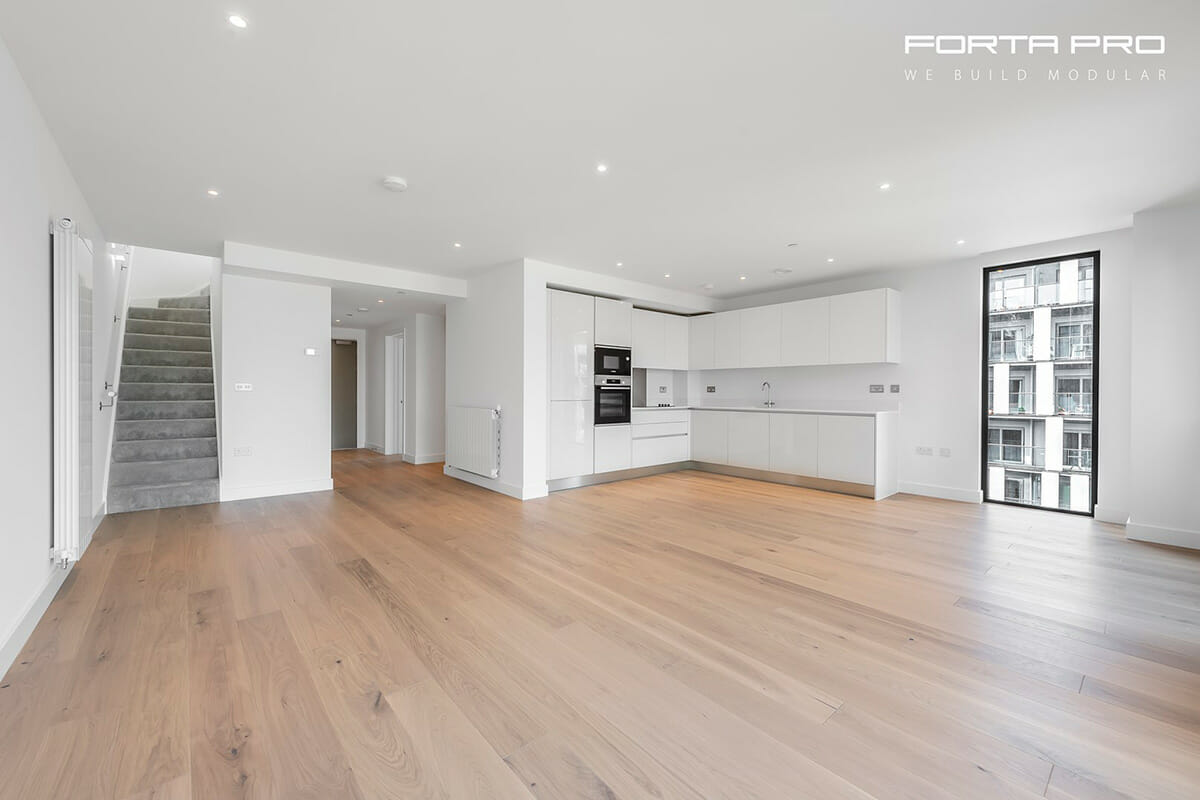
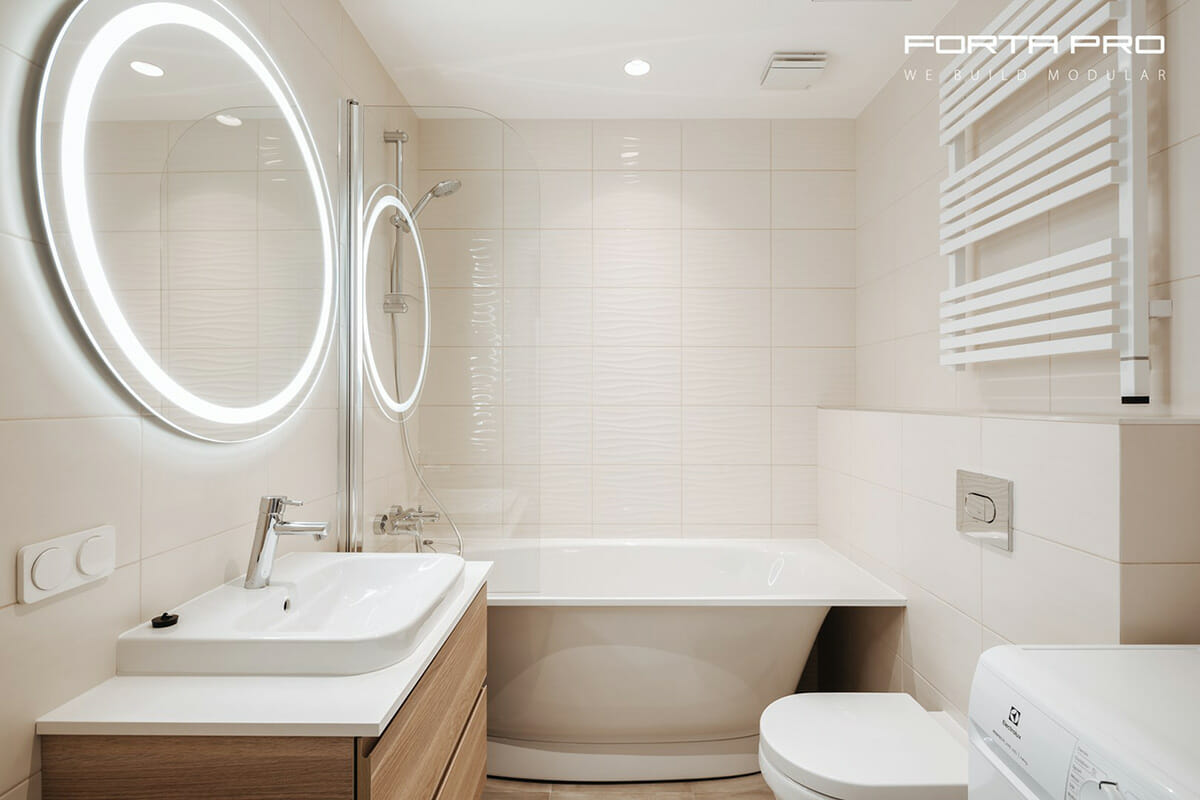
Kristaps Miķelsons, Diretor de Tecnologia da Forta PRO, explicou que o projeto foi relativamente simples, pois o Marriott Moxy tinha um livro de projeto para cada tipo de quarto que listava as especificações de materiais, dimensões e outras informações. A Forta PRO traduziu esses projetos em desenhos modulares, eles foram aprovados pela Marriott e, em seguida, a Forta PRO encomendou os materiais de acabamento dos fornecedores da Marriott.
De acordo com Miķelsons, o objetivo do protótipo era "dissipar as dúvidas das pessoas e mostrar as possibilidades da construção modular". A Marriott queria mostrar aos investidores a qualidade aprimorada e a maior velocidade disponíveis por meio de um processo modular. A esperança era que os investidores ficassem impressionados e fizessem parceria com a Marriott em desenvolvimentos futuros.
O projeto teve seus desafios. Como a empresa está acostumada a produzir módulos que são colocados dentro de um edifício, o protótipo teve de ser especialmente construído com um exterior capaz de resistir aos elementos. Além disso, houve atrasos no envio de materiais, bem como a dificuldade de entregar o módulo em seu local de descanso final quando um guindaste não podia ser instalado no local devido a uma estrutura de estacionamento subterrâneo. O guindaste teve que ser estacionado em um posto de gasolina próximo e os movimentos tiveram que ser feitos com precisão cirúrgica.
Apesar dessas dificuldades, o projeto parece ter sido um sucesso, já que os dois estão atualmente trabalhando juntos em vários projetos potenciais.
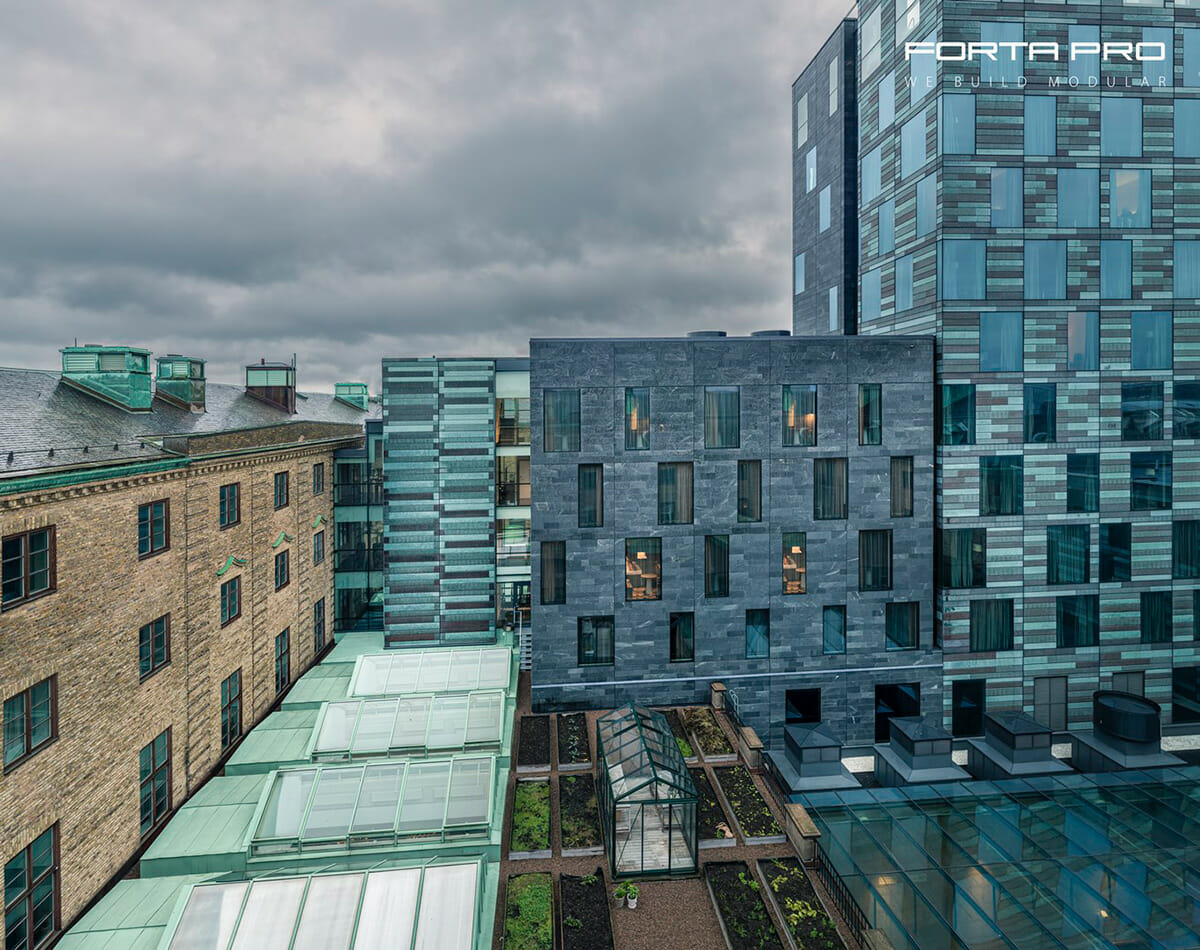
Desde então até agora
A Forta PRO começou em novembro de 2013 como SIA Forta Medical, pois a empresa estava produzindo soluções modulares de alta qualidade para instalações e equipamentos médicos. Em março de 2018, o nome foi alterado para SIA Forta Prefab e a marca Forta PRO começou.
Atualmente, a empresa é especializada em edifícios modulares multifamiliares e comerciais de vários andares, incluindo edifícios médicos, hotéis, apartamentos, dormitórios e PODs de banheiro. A empresa tem duas fábricas, sendo a principal em Ventspils, na Letônia, e a outra em Jelgava, na Letônia, e a produção total é de 120.000 metros quadrados por ano. A fábrica de Ventspils opera quatro linhas de produção com capacidade de até quatro módulos por dia e 75.000 metros quadrados por ano. Cada módulo leva cerca de vinte dias para ser construído. Seus projetos estão localizados principalmente nos países escandinavos, no Reino Unido, na Alemanha e em outros países do norte da Europa.
Aprimoramentos no design e na produção
A vantagem de seu projeto para edifícios modulares de vários andares é a resistência estrutural proporcionada por uma estrutura rígida de aço. Com essa estrutura, eles podem construir edifícios de até oito andares de altura sem reforço adicional. Os edifícios com mais de oito andares exigem um núcleo de concreto.
Os módulos são aparafusados uns aos outros e à laje da fundação. Placas de gesso e estruturas de aço leve são usadas nas paredes internas, e lã mineral é fornecida para isolamento. Seu processo de produção conta com pelo menos vinte verificações de qualidade para garantir a qualidade e a resistência de cada módulo.
Os shafts para redes mecânicas, elétricas e de encanamento estão incluídos nos módulos e serão conectados a esses sistemas no local. Os corredores comuns são deixados sem acabamento para facilitar as conexões de utilidades. Com essa configuração, muitas das conexões dos módulos podem ser concluídas sem entrar nas salas dos módulos.
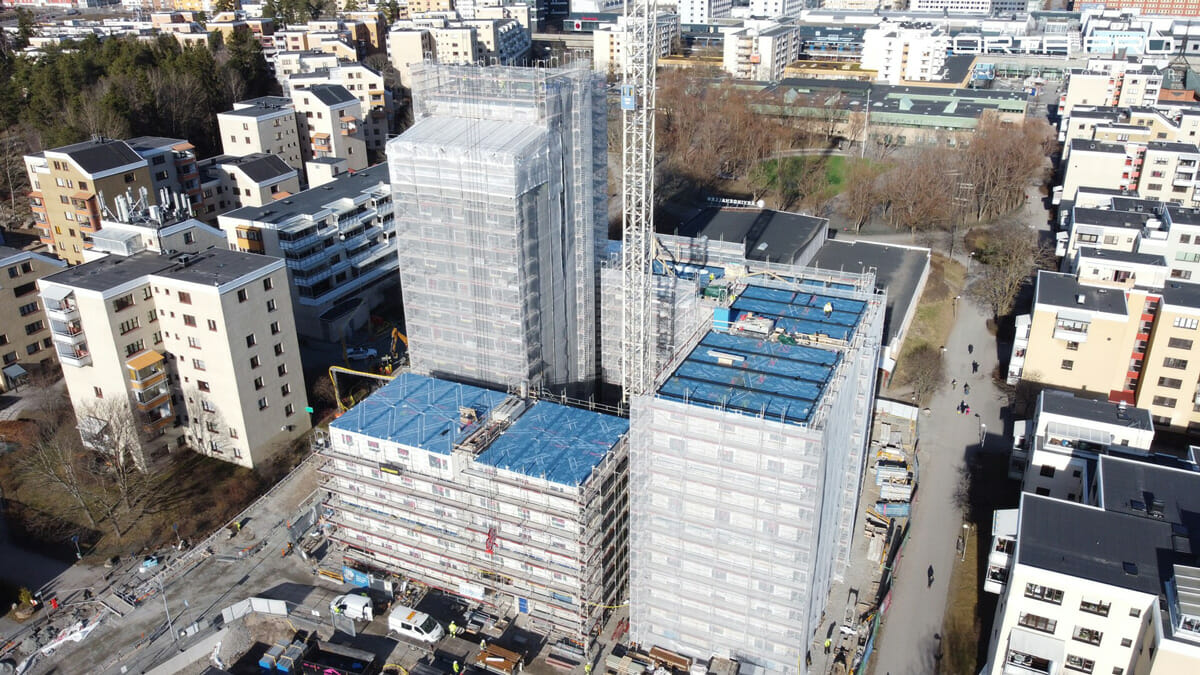
Os benefícios da construção modular
Ao falar sobre o processo de construção modular, Aviv Brosilovski, responsável pelo desenvolvimento de negócios, enfatiza três vantagens principais em relação à construção tradicional, incluindo cronogramas de projeto reduzidos, controle de qualidade e economia de custos.
Os cronogramas dos projetos são mais curtos devido à velocidade obtida com o design repetitivo, que geralmente é encontrado em projetos de residências multifamiliares e hotéis. Como muitas das unidades são projetadas de forma semelhante e se repetem várias vezes ao longo do projeto, o design pode ser facilmente replicado com o uso de módulos. Além disso, a velocidade é maior porque o trabalho nos módulos está em andamento enquanto o trabalho no local está sendo concluído. Essa capacidade de programar o trabalho simultaneamente pode economizar um tempo significativo no cronograma do projeto.
Como a construção modular ocorre em ambientes de fábrica controlados, a qualidade pode ser rigorosamente monitorada e controlada. Os processos de produção podem ser padronizados e o maquinário preciso, como robôs e impressoras 3D, pode ajudar a garantir a qualidade das unidades de construção, o que é particularmente importante para projetos maiores.
As fontes de economia de custos incluem redução dos custos de mão de obra devido à eficiência, minimização do desperdício de material e geração antecipada de receita devido à conclusão mais rápida do projeto. Essas economias geralmente compensam o custo inicial de investimento em métodos de construção modular.
A Forta PRO teve que fazer algumas alterações em sua cadeia de suprimentos devido ao conflito na Ucrânia. Eles observaram um aumento nos custos de energia e atrasos de materiais que afetaram a programação do projeto. Com o fornecimento de materiais de outros locais, eles conseguiram continuar a ser produtivos. Como muitos outros, eles esperam uma solução rápida e um retorno ao relacionamento com seus parceiros ucranianos com os quais trabalharam ao longo dos anos.
Um futuro brilhante
Por esses motivos e muitos outros, a Forta PRO espera que o mercado de construção modular continue a crescer. Brosilovski acredita que técnicas de fabricação aprimoradas e automatizadas continuarão a melhorar a precisão, a qualidade e a escalabilidade da construção modular. Para ele, avanços como robótica, impressão 3D e automação levarão a projetos mais complexos e inovadores. Ele também considera a sustentabilidade um fator importante, pois mais empresas estão procurando incorporar recursos de eficiência energética, energia renovável e materiais ecologicamente corretos, o que ajudará a impulsionar a tendência contínua de práticas de construção mais ecológicas e regulamentações ambientais mais rígidas. A versatilidade dos projetos modulares é outra maneira pela qual o mercado pode crescer. Os desenvolvimentos nas áreas de saúde, educação, hotelaria e infraestrutura podem ser os projetos modulares do futuro.
O futuro da Forta PRO continua a levá-la a novos mercados. A empresa uniu forças com a Samsung C&T da Coreia do Sul para desenvolver planos de expansão na Letônia e em outros países. O objetivo é expandir o uso da construção modular e abrir e operar fábricas modulares em todo o mundo. Eles também planejam compartilhar o conhecimento que adquiriram com anos de experiência em construção modular. As duas empresas já têm um histórico de trabalho conjunto em muitos projetos, portanto a parceria é uma extensão desse relacionamento.
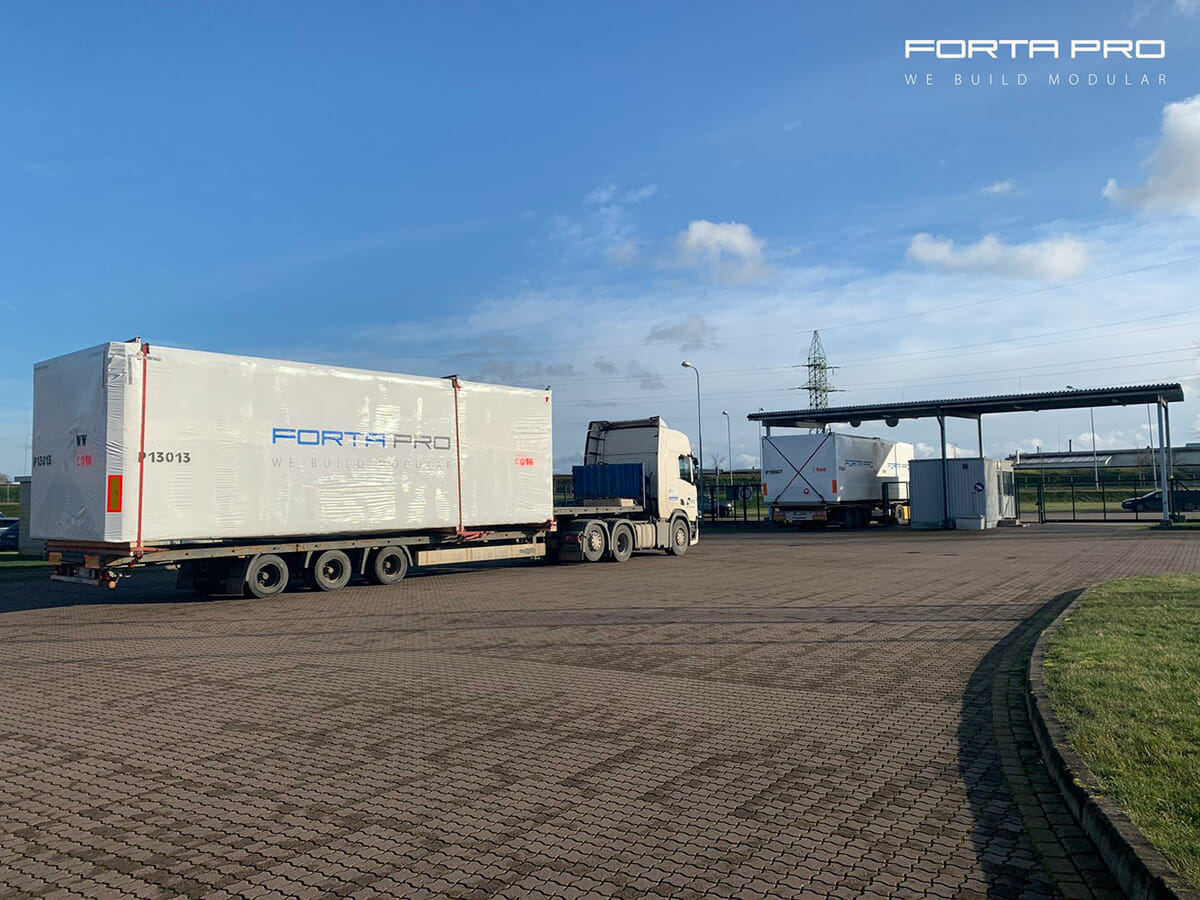
A empresa foi homenageada com duas indicações como finalista do Projeto Internacional do Ano no concurso Offsite Awards 2023. Os projetos indicados são o Hage's Badehotel e o Unity Malmö. O Badehotel é um hotel construído com unidades modulares na Dinamarca, enquanto o Unity Malmö é um grande empreendimento de apartamentos modulares na Suécia. A Forta PRO já foi reconhecida anteriormente com prêmios semelhantes. Em 2020, o projeto Berkeley Homes, um prédio de apartamentos em Londres, ganhou o prêmio Private Housing Project of the Year. Em 2021, o Project Jylland, um projeto de moradia estudantil na Suécia, ganhou o prêmio International Offsite Project of the Year. Os vencedores deste ano serão anunciados na Offsite Expo em Coventry, Reino Unido, em 19 de setembro de 2023.
Sobre o autor: Dawn Killough é escritora freelancer de construção com mais de 25 anos de experiência trabalhando com empresas de construção, subcontratadas e empreiteiras gerais. Seus trabalhos publicados podem ser encontrados em dkilloughwriter.com.
Mais sobre a Modular Advantage
A AoRa Development pretende construir o primeiro edifício triplo zero líquido de Nova Iorque utilizando métodos modulares
Mais cidades estão fornecendo financiamento para projetos de infraestrutura mais recentes, desde que atendam aos requisitos de sustentabilidade. É assim que o modular pode se encaixar no projeto, graças à sua menor produção de resíduos.
Desenvolvedores e designers: lições aprendidas com o design modular
A construção modular é atraente para muitos desenvolvedores porque o trabalho no local e a construção dos módulos podem ocorrer simultaneamente, encurtando o cronograma e reduzindo custos adicionais.
UTILE: Colocando a construção modular em um caminho rápido
Em Quebec, a UTILE está assumindo a liderança na criação de edifícios modulares acessíveis para ajudar a diminuir a escassez de moradias para estudantes. Durante o processo, a empresa descobriu o que é necessário para tornar a transição para a construção modular um sucesso.
Sobha Modular ensina desenvolvedores a pensar como fabricantes
Com sua fábrica de 250 mil metros quadrados nos Emirados Árabes Unidos, a Sobha Modular está levando seus banheiros modulares de alta qualidade para residências de luxo em Dubai, enquanto desenvolve projetos modulares para os Estados Unidos e a Austrália.
RoadMasters: Por que o planejamento antecipado do transporte é fundamental na construção modular
Na construção modular, o transporte é frequentemente chamado de “elo perdido”. Embora raramente interrompa um projeto por completo, um planejamento inadequado pode causar atrasos dispendiosos, mudanças de rota e excedentes orçamentários.
Navegando pelos riscos no setor imobiliário comercial e na construção modular: insights de um veterano com 44 anos de experiência no setor
Os projetos modulares envolvem fabricação, transporte e montagem no local. Os desenvolvedores devem entender exatamente quais são suas responsabilidades e quais são as responsabilidades dos subcontratados. Os consultores de risco devem pesquisar os contratados, subcontratados e consultores de projeto e construção do desenvolvedor, especialmente o fabricante modular.
Art²Park – Uma aplicação criativa da construção modular e convencional
O Art²Park é mais do que um edifício-parque — é uma demonstração do que a construção modular pode alcançar quando cuidadosamente integrada com materiais tradicionais. O uso de contêineres de transporte proporcionou não apenas benefícios em termos de velocidade e sustentabilidade, mas também um núcleo estrutural robusto que simplificou e fortaleceu o restante do edifício.
Construção mais inteligente: um novo padrão em eficiência na construção modular
O aumento dos preços dos materiais, a escassez de mão de obra, o financiamento caro e o endurecimento das regras ambientais tornaram a construção convencional mais lenta, mais cara e mais imprevisível. Para manter os projetos dentro do prazo e do orçamento, os construtores estão cada vez mais recorrendo a métodos industrializados mais inteligentes.
Resia: quebrando todas as regras
A Resia Manufacturing, uma divisão da Resia, sediada nos EUA, agora oferece componentes pré-fabricados para banheiros e cozinhas a parceiros do setor. Sua instalação de fabricação híbrida produz componentes (módulos) de banheiro e cozinha mais precisos, com maior rapidez e menor custo do que a construção tradicional. Veja como a Resia Manufacturing faz isso.
Como a LINQ Modular inova para levar a tecnologia modular ao mercado nos Emirados Árabes Unidos e em outros países
A LINQ Modular, com um escritório e três instalações de fabricação em Dubai, é uma empresa modular sediada nos Emirados Árabes Unidos. A empresa está em uma missão: abrir os mercados de habitação e construção na área do Conselho de Cooperação do Golfo (GCC) com o modular.










